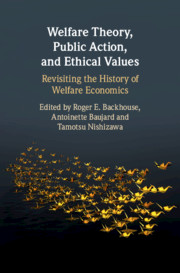Book contents
- Welfare Theory, Public Action, and Ethical Values
- Welfare Theory, Public Action, and Ethical Values
- Copyright page
- Contents
- Figures and Tables
- Contributors
- Acknowledgements
- Introduction: Revisiting the History of Welfare Economics
- Part I Plurality of Welfare in the Making of Welfare Economics
- 1 Ruskin’s Romantic Triangle
- 2 Radicalism versus Ruskin
- 3 Alfred Marshall on Progress and Human Wellbeing
- 4 Pigou’s Welfare Economics Revisited
- 5 To Which Kind of Welfare Did Léon Walras Refer?
- 6 Value Judgement within Pareto’s Economic and Sociological Approaches to Welfare
- Part II Developing Modern Welfare Economics
- Index
- References
3 - Alfred Marshall on Progress and Human Wellbeing
from Part I - Plurality of Welfare in the Making of Welfare Economics
Published online by Cambridge University Press: 04 March 2021
- Welfare Theory, Public Action, and Ethical Values
- Welfare Theory, Public Action, and Ethical Values
- Copyright page
- Contents
- Figures and Tables
- Contributors
- Acknowledgements
- Introduction: Revisiting the History of Welfare Economics
- Part I Plurality of Welfare in the Making of Welfare Economics
- 1 Ruskin’s Romantic Triangle
- 2 Radicalism versus Ruskin
- 3 Alfred Marshall on Progress and Human Wellbeing
- 4 Pigou’s Welfare Economics Revisited
- 5 To Which Kind of Welfare Did Léon Walras Refer?
- 6 Value Judgement within Pareto’s Economic and Sociological Approaches to Welfare
- Part II Developing Modern Welfare Economics
- Index
- References
Summary
Marshall’s contribution to welfare economics is often summarized in the analytical tools developed in his Principles of Economics. This paper places Marshall’s views on welfare or rather ‘wellbeing’ in more broad perspective including his notes on ‘Economic Progress’; how Marshall thought of ‘economic, as well as the moral, wellbeing’, in his ‘high theme of economic progress’ or ‘organic life-growth’. It shows how he thought of the progress and ‘wellbeing’, economic as well as ‘physical, mental and moral’, in relation to ‘standards of life’ and to ‘quality of life’, ‘fullness of life’; and it aims to shed a fresh light to reconsider the welfare economic thought of Marshall.
Keywords
- Type
- Chapter
- Information
- Welfare Theory, Public Action, and Ethical ValuesRevisiting the History of Welfare Economics, pp. 77 - 96Publisher: Cambridge University PressPrint publication year: 2021
References
- 1
- Cited by



